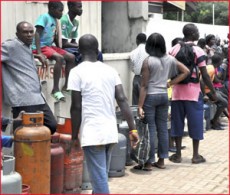Many Ghanaians who use Liquefied Petroleum Gas (LPG) in their homes are expected to go without the product for at least one year or more. Local industries that also use gas will not be left out of the pain as it will cripple productivity and affect revenue levels.
This is because the perennial shortage of Liquefied Petroleum Gas (LPG) may last for 12 months due to the lack of capacity to produce enough supply for consumers. Officials at the National Petroleum Authority (NPA) yesterday told Joy FM Super Morning Show that though the situation is quite disturbing, they hope the situation will improve.
Pumping and delivery constraints, as well as inadequate storage on the part of the Tema Oil Refinery (TOR) which stores about 7,000 metric tonnes of LPG, have been the major contributors to the shortages. The West Africa Gas Pipeline project which could ease the crisis is also faced with infrastructural and logistics challenges.
Yaro Kasambata, Public Relations Officer of NPA, said work has been ongoing to expand the capacity to produce and supply LPG but doubts whether it will have an impact until next year.
He earlier told Citi FM Breakfast Show that “Seven months is not enough time to be able to comprehensively deal with the infrastructural challenges that we have. “For example, if we need to expand the pipe we have, the expert says that from six inches in diameter, we need to move to about 8 inches in diameter”.
“What that means is that it increases your flow rate because the bigger the pipe, the more products can pass through at a time. It takes about 24 months to complete a typical storage facility and they started somewhere last year. We hope to put the facility in use in the early part of next year,” Mr. Kasambata noted.
However, many people doubt the NPA’s assurance that there will be adequate consignment to deal with the problem.
Since the beginning of the year, there have been regular reports of shortage of LPG across the country. Consumers often troop to gas filling stations to search for the petroleum product for domestic use.
Taxi drivers who have converted their engines into LPG are also seen in queues at gas filling stations, searching for the fuel to buy. This has even raised arguments for a ban on vehicles that use LPG or a policy to regulate such vehicles.
Business News of Tuesday, 9 August 2011
Source: Business Guide
Gas Shortage To Last 1 Year

















